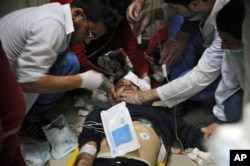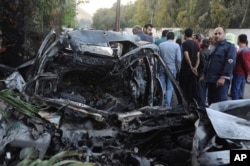Syrian government forces pressed their offensive Saturday against the last rebel-held town in eastern Ghouta under the cover of airstrikes as shelling of civilian areas on both sides claimed more lives, state media and opposition activists said.
Syrian government forces had resumed their offensive on rebel-held Douma on Friday afternoon after a 10-day truce collapsed over disagreement regarding evacuation of opposition fighters. Violence resumed days after hundreds of opposition fighters and their relatives left Douma for rebel-held areas in northern Syria.
A reporter for Lebanon's Al-Manar TV embedded with Syrian troops near Douma said government forces advanced toward Douma from the towns of Misraba and Madiara that were recently captured by troops. Al-Manar TV is run by Lebanon's Hezbollah group, which has sent thousands of fighters to Syria to back government forces.
The government-controlled Syrian Central Military Media said government forces captured several farms Saturday on the southern and western edges of the city, which is home to tens of thousands of people. SCMM said the area controlled by the Army of Islam in and around Douma was 19 square kilometers (7.3 square miles).
The group said its fighters had repelled all government attacks that began Friday, adding that 17 Syrian soldiers had been killed.
By Saturday evening, state media was reporting that troops were approaching Army of Islam fortifications on the edge of the town, adding that street battles could begin soon. It said warplanes bombarded the group's headquarters and command and control center.
State TV said Army of Islam fighters had pelted several neighborhoods in Damascus with mortar shells, killing six civilians and wounding more than 30.
The Britain-based Syrian Observatory for Human Rights said the bombardment of Douma had killed eight people and wounded 48, including 15 children.
Gas attacks alleged
Some opposition activists in Douma posted photographs of people wearing gas masks, saying that government forces were shelling the town with poison gas. State media denied the reports, saying that "such farces about chemical weapons'' had been triggered by the troops' quick push toward Douma.
On Friday, opposition activists said 40 people were killed in Douma while state media said four were killed in government-held Damascus.
Government forces launched a crushing offensive in February and March on eastern Ghouta, capturing dozens of towns and villages and forcing thousands of opposition fighters to surrender and evacuate the area toward Syria's north.
A deal was reached last month to evacuate Douma, but activists and state media reported that the Army of Islam group demanded amendments to the deal.
The Observatory said the Russian response to the Army of Islam was a list of demands, including handing over heavy weapons within three days and light weapons thereafter, in return for government forces' withdrawal from the outskirts of Douma within a week.
The Observatory also said that the Russians promised the rebels that once they handed over their weapons, airstrikes would stop. It added that fighters who handed over their weapons could join a local police force that will be established in Douma, mostly consisting of Army of Islam members who would be given Russian weapons to fight members of the Islamic State group and al-Qaida-linked fighters.
Army of Islam military spokesman Hamza Bayraqdar told The Associated Press by text message, "The Russians are making humiliating demands that mean surrender and handing over the area. This is something that we categorically reject.''
Russia's military said the Army of Islam had forced out leaders who were taking part in negotiations to withdraw from Douma and that their fighters had resumed attacks.
Major General Yuri Yevtushenko, head of the Russian center for reconciliation of the warring parties in Syria, said that "as a result of sharp opposition among the odious militants and those who were prepared to participate in the negotiations process, the former leaders of the group [known as] Abu Humam, Abu Omar and Abu Ali were physically removed.''
He said the information had come from a close aide of Abu Humam.
Observation post in Idlib
In northern Syria, the Turkish military said on its Twitter account that it had established the ninth observation post in the rebel-held province of Idlib as part of the de-escalation agreement with Russia and Iran. Turkey's official Anadolu news agency said the military convoy had reached the town of Morek in Idlib province.
Eastern Ghouta was part of the same de-escalation plan signed last year in the Kazakh capital, Astana. Turkey's presidential spokesman said that the Turkish military presence in Idlib would serve as a "guarantee'' against attacks to ensure that it did not meet the same fate as eastern Ghouta.
Ibrahim Kalin said, "The Russians and the Iranians have a full understanding of this,'' adding that the Syrian regime also understood that "Turkish soldiers are not to be attacked in those areas.''
Elsewhere in Syria, a bomb exploded in the Aleppo town of al-Bab, which is controlled by Turkey-backed opposition fighters, killing nine people and wounding 15, according to the activist media collective Aleppo Media Center. The Observatory said eight people were killed in the blast, which occurred near the town's Grand Mosque.






